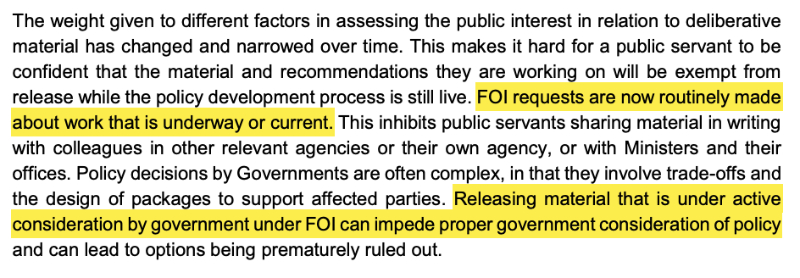In an extraordinary pitch for a public servant scrutiny void, senior public servants have blamed Robodebt on transparency. Former Senator Rex Patrick reports on a leadership failure.
In its submission to the Senate’s inquiry into the Albanese Government’s new FOI Bill, the Australian Public Service Commission (APSC) argued that too much transparency was the cause of scandals such as Robodebt and the Home Insulation debacle.
In a sea of submissions arguing against the Bill, the Commission was a lone ship steering towards Secrecy Island, seeking refuge from choppy transparency seas.
While Royal Commissioner Catherine Holmes’ concluded that, “It is likely the Scheme would not have run in the same way, for the length of time that it did, or at all, if there had been proper stakeholder consultation and transparency in its design and implementation.”
The APSC has come up with a different conclusion. Robodebt wasn’t caused by failed leadership, it wasn’t caused by officials quietly advancing their careers while turning a blind eye to bad stuff happening on their watch. Nor were malfeasance or misfeasance involved. Rather transparency is to blame!

APSC Senate Submission Extract (Source: Senate)
Pitching for oversight sanctuary
The APSC acknowledges that “Under the Public Service Act, public servants have a duty to provide frank and honest, evidence based professional advice to their Ministers”. It then seeks to weasel out of that responsibility saying that transparency around advice has made it “harder for public servants to do their duty”. The APSC argues for changes to the system to make life easier for our public servants as as they work behind the scenes to advise and influence ministers on how we are governed.
It’s worth remembering that the ‘hard done by’ bureaucrats that actually shape, approve and submit advice to ministers are very senior and earn between $200k and $1m per annum.
Perhaps the Commissioner ought to read a recent Administrative Review Tribunal judgement by Senior Member Dr Nicholas Manetta, who said of disclosure of official’s advice in response to an FOI:
“Those tasked with the management of the public service and liaising with the Minister’s office can be expected, in my opinion, to ensure that the Minister remains properly informed, and informed in writing where it is appropriate to do so. This is a fundamental aspect of public administration. I do not accept the submission that acceding to the FOI request in this case could reasonably be expected to result in a dereliction in the performance of this core task …”
Dr Manetta did not propose opaqueness as a remedy to officials censoring their advice in the response to the FOI regime. In the face of public servants backing off on their advice he advised:
“… there appears to be a relatively straightforward way to address it; namely, by reinforcement of APS values within [an] agency (whether by formal direction or otherwise).”
Clearly, no such leadership is to be found at the APSC.
Fait acompli disclosure
Despite one of the objectives of the FOI Act being to allow citizens to participate in democracy, the APSC only wants transparency after decisions have been made.

APSC Senate Submission Extract (Source: Senate)
Never mind that it is the public that pays public servants for the advice being generated and it is the public that are affected by the advice given. In the eyes of the APSC, it is the public who are the problem.
Perhaps the APSC will be invited to appear before the Senate committee to give evidence. Maybe, if they’re honest with the senators about where they want things to end up, they’ll make a pitch that the nomenclature of ‘senior public servant’ be changed to ‘senior self servant’.
Rex Patrick is a former Senator for South Australia and, earlier, a submariner in the armed forces. Best known as an anti-corruption and transparency crusader, Rex is also known as the "Transparency Warrior."

